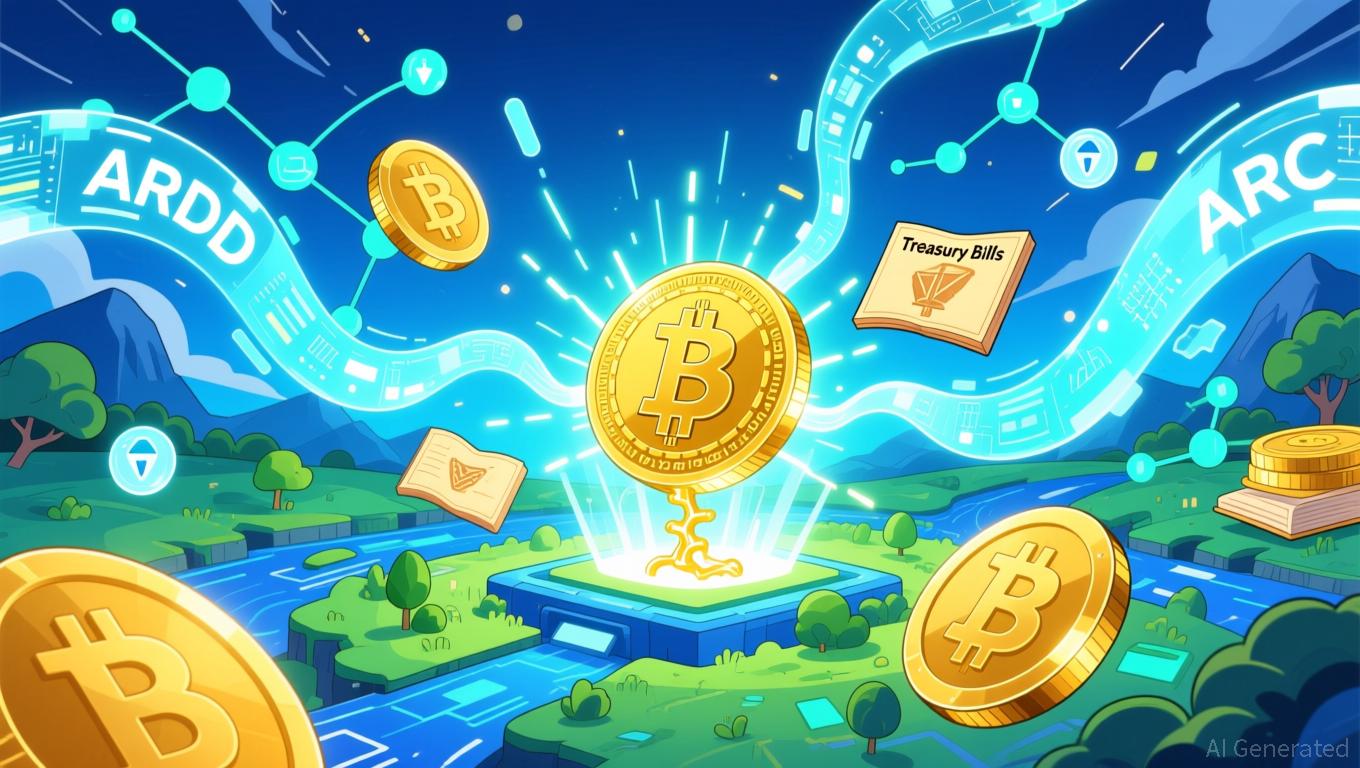India's plan for a sovereign stablecoin disrupts the international cryptocurrency landscape through its dual-rupee approach
- India's government collaborates with Polygon and Anq to develop a sovereign-backed stablecoin (ARC) collateralized by G-Secs and Treasury Bills. - The "Twin-Rupee" model combines RBI's CBDC for settlement with private ARC tokens for transactions, balancing innovation and monetary control. - Polygon's institutional tokenization expertise and Anq's regulatory insights aim to reduce remittance costs and strengthen India's bond market liquidity. - The initiative counters foreign stablecoin risks by anchoring
India's cryptocurrency sector is experiencing significant changes as blockchain companies Polygon and Anq consult with Sanjeev Sanyal, economic advisor to Prime Minister Narendra Modi, to discuss the possibility of a government-backed stablecoin framework
The envisioned stablecoin, provisionally called the Asset Reserve Certificate (ARC), would be entirely backed by Indian government securities (G-Secs) and Treasury Bills,

Polygon, recognized globally for its blockchain scaling solutions, and Anq, a fintech company based in Bangalore, are combining their strengths for this initiative
This project demonstrates India’s careful yet forward-thinking stance on digital finance. While stablecoins such as
As Polygon and Anq continue to develop their proposal, government advisors are reportedly emphasizing the need for clear regulations to encourage adoption while protecting financial stability
Disclaimer: The content of this article solely reflects the author's opinion and does not represent the platform in any capacity. This article is not intended to serve as a reference for making investment decisions.
You may also like
ZEC drops 5.17% over 24 hours as significant companies embrace it and privacy coins experience a surge
- Cypherpunk Technologies, rebranded from Leap Therapeutics, committed $50M to Zcash (ZEC), acquiring 1.25% of its supply via a $58.88M Winklevoss Capital-led private placement. - The firm plans to accumulate at least 5% of ZEC’s total supply, with new leadership emphasizing long-term value creation through privacy-focused digital assets. - Tyler Winklevoss of Gemini highlighted Zcash as "encrypted Bitcoin ," stressing privacy as essential for digital freedom and a potential complement to Bitcoin’s transpa
DASH Experiences Rapid Growth in November 2025: Institutional Investments and Blockchain Innovations Propel Momentum
- DoorDash's stock surged in November 2025 due to institutional investment inflows and blockchain logistics partnerships. - Major investors like Vanguard and AQR increased stakes by 25.8%-442.5%, signaling renewed confidence in the company's market position. - The expansion of blockchain-enabled autonomous delivery with Coco Robotics in Miami reduced costs and carbon footprints, enhancing DoorDash's competitive edge.

Bitcoin Updates: Bitcoin Hash Rate Climbs Despite ETF Withdrawals and Global Tensions
- Bitcoin's hash rate hits 1.19B TH/s amid ETF outflows and geopolitical risks, showing network resilience despite $1.17B in weekly redemptions. - Price rebounds 4.4% to $106,000 driven by retail demand and Senate funding bill progress, though ETF redemptions and OG selling persist as headwinds. - Blockchain innovations like CreditBlockchain's XRP platform and divergent miner profits ($180M vs -$266M Q3) highlight sector fragmentation and growth opportunities. - Regulatory clarity post-government shutdown

Merchants Secure Greater Authority Over Card Acceptance in $38 Billion Visa-Mastercard Agreement, Though Critics Highlight Ongoing Concerns
- Visa and Mastercard reached a $38B settlement with U.S. merchants over swipe fee disputes, ending a 20-year antitrust battle. - The deal reduces interchange fees by 0.1% for five years, caps consumer rates at 1.25%, and grants merchants flexibility to reject high-fee cards. - Critics argue the agreement fails to address systemic industry issues, with merchants warning it preserves payment giants' fee-raising power. - Analysts warn the changes could disrupt rewards ecosystems, while lawmakers push for ref
